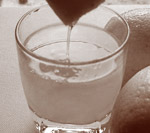 The juice from a fresh lemon, orange, lime, and grapefruit is the best form of flavor, specially in lemon juice. Bottled lemon juice can be substituted only if fresh lemons are not available.
The juice from a fresh lemon, orange, lime, and grapefruit is the best form of flavor, specially in lemon juice. Bottled lemon juice can be substituted only if fresh lemons are not available.
* Room-temperature lemons, limes and orange will yield more juice than those that are refrigerated.
* Microwaving the fruit for 15 to 20 seconds before squeezing will help extract more juice. Don't overdo it. You don't want to boil the juice.
* Use your palm to roll lemon, lime, or orange around on the countertop a few times before squeezing.
* If just a few drops of juice are needed, pierce the skin with a toothpick and squeeze out what you need. To store it, reinsert the toothpick, put the lemon or lime into a plastic bag, and refrigerate.
* Store fresh lemon juice in the refrigerator for a week or so. NOTE: If I have a large amount of juice to store, I put the juice in ice cube trays and freeze for later use.
* When I am in a hurry, I cut the lemon in half, and then cup one hand under the lemon as squeeze the lemon with the other hand. The cupped hand is to catch the seeds.
When looking for citrus fruit (such as lemons, limes, oranges, an grapefruit) for juicing, avoid ones with bruises, wrinkled, or discolored skin. Choose lemons that have smooth skins and are heavy for their size. Lemons contain 30 to 45 percent juice depending on variety, climate, maturity when harvested, and storage conditions.

1 medium lemon = approximately 2 to 3 tablespoons of lemon juice = 1 tablespoon of lemon zest (peel)

1 medium lime = approximately 2 tablespoons lime juice = 1 teaspoon lime zest (peel)

1 medium orange = approximately 1/3 to 1/2 cup juice = 2 tablespoons orange zest (peel)

